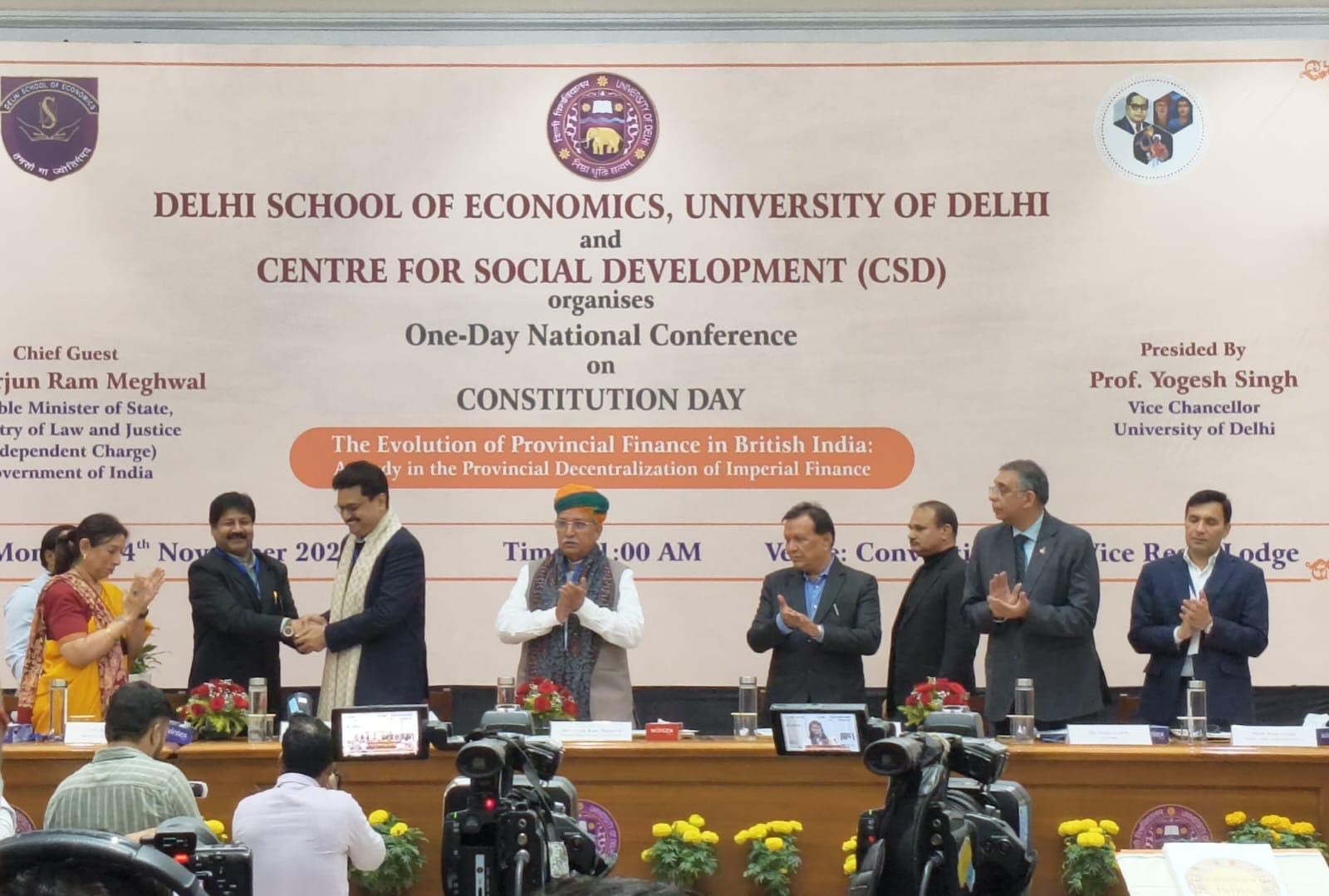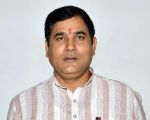Delhi: A one-day national seminar was organised at the Vice-Regal Lodge, Convention Hall, under the joint auspices of the Delhi School of Economics and the Centre for Social Development, University of Delhi, to mark the occasion of Constitution Day. The program began with the ceremonial lighting of the lamp and the Kulgeet of the University of Delhi. The event was graced by Hon’ble Shri Arjun Ram Meghwal, Minister ofLaw and Justice, Government of India, as the Chief Guest and Keynote Speaker. Also present on the dais were Prof. Yogesh Singh, Vice Chancellor, University of Delhi; Prof. Balaram Pani, Dean of Colleges; Prof. Rajni Abbi, Director, South Campus; Dr. Vikas Gupta, Registrar, University of Delhi; Prof. Ram Singh, Director, Delhi School of Economics; and Dr. Rajkumar Falwariya, Associate Professor, SPM College & Chairperson (CSD). The seminar was attended by several Principals of various colleges, Heads of Departments, faculty members, and research scholars of the University.
Academic Tribute to Dr. B.R. Ambedkar by Prof. Ram Singh
Initiating the seminar’s academic theme, Prof. Ram Singh, Director of Delhi School of Economics, offered a scholarly tribute to Dr Bhimrao Ramji Ambedkar, emphasising the critical need to recognise Ambedkar’s contributions within Indian economic and political history. He stated that Ambedkar’s seminal work on federal finance and constitutional reforms must continue to receive attention in contemporary scholarship.
Highlighting Articles 270 to 280 of the Indian Constitution, Prof. Singh explained Ambedkar’s role in rationalising fiscal relations between the Centre and the States, building a balanced structure that strengthened cooperative and fiscal federalism. He asserted that these provisions portray Ambedkar not merely as a social reformer but also as an economic historian, who integrated economics, politics, and governance into a comprehensive developmental framework.
Prof. Singh further examined Ambedkar’s 1925 thesis and subsequent works, which laid foundational principles of a modern state, ensuring financial autonomy and political accountability. His academic writings on municipal administration, public finance, and urban development demonstrate that economic growth is closely linked toinstitutional capacity and state-level empowerment. He concluded by stressing the need for future research, policy engagement, and broader public recognition of Ambedkar’s economic contributions to shaping India’s constitutional and developmental trajectory. Prof. Yogesh Singh, Vice Chancellor of Delhi University, began his address by shedding light on the broader meaning of Ambedkar. He stated that the term “Ambedkar” is not confined merely to reservation or scholarships; rather, it symbolises sacrifice, austerity, vision, and struggle. He explained that Dr B.R. Ambedkar believed in either opposition or cooperation, depending on the necessities of the time. He is regarded as a true and farsighted thinker of economic systems. Prof. Singh emphasised that if there was anyone who had the courage to call truth as truth, it was Babasaheb Ambedkar. Prof. Singh also mentioned that Babasaheb supported the concept of urbanisation and had strongly advocated for the establishment of equality even before India attained independence. In his address, he said that “Babasaheb was omniscient” and possessed profound knowledge of both Indian and global intellectual traditions. He also discussed the concepts of ‘Sukhmay MoolamDharmaḥ’ and ‘Dharma Moolam Arthaḥ’. He further stated that Babasaheb’s contribution and economic insights in the establishment of the Reserve Bank of India (RBI) can never be forgotten. Concluding his address, he encouraged scholars to undertake extensive research and study on Babasaheb’s seminal doctoral work, “The Evolution of Provincial Finance in British India,” and motivated everyone to delve further into it.
Keynote Address by Hon’ble Minister Shri Arjun Ram Meghwal
Delivering the keynote address as the Chief Guest, Hon’ble Minister Shri Arjun Ram Meghwal (Ministry of Law & Justice, Independent Charge, Government of India) emphasized that Constitution Day is not merely a day of remembrance, but a significant occasion to understand the democratic ethos, civic consciousness, and accountable governance of India.
Discussing historical developments leading to the framing of the Constitution, he highlighted major events of Indian history. He explained that the Battle of Plassey (1757) laid the foundation of British rule in India, which gradually expanded under the East India Company. He also noted how Indian scholars and writers drew revolutionary inspiration from the Revolt of 1857, marking the emergence of nationalist consciousness. According to him, the British Crown’s rule in 1858 marked the beginning of direct colonial imperialism, bringing about widespread social, political, and economic changes.
Reflecting on India’s march toward freedom, Shri Meghwal elaborated on the role of the Home Rule Movement and called the Government of India Act of 1935 a crucial step in restructuring India’s administrative apparatus for democratic governance. He asserted that the continuous struggles of the freedom movement finally paved the way for the adoption of the Constitution on 26 January 1950, and the 1952 First Lok Sabha Elections gave concrete shape to parliamentary democracy in India.
The Minister further highlighted the core constitutional values—Liberty, Justice, Equality, Fraternity, and Rule of Law—stating that the Constitution is not merely a legal document but a powerful foundation guiding India’s democracy. He stressed that not only framing the Constitution but its continuous implementation is equally vital. Constitution Day serves as a reminder of both the rights and the duties of citizens. He recognised the resilience and adaptability of the Indian democracy as a model appreciated globally. The session concluded with a vote of thanks and a collective reaffirmation by participants to uphold constitutional principles.
Vote of Thanks
The seminar concluded with Dr Rajkumar Falwariyapresenting the vote of thanks. He summarised key academic insights of the session and expressed gratitude to all distinguished guests, faculty members, participants, and organisers whose contributions made the event a success.





